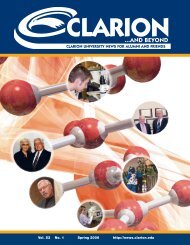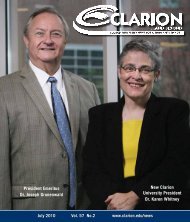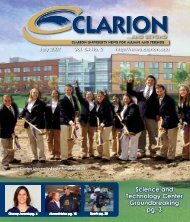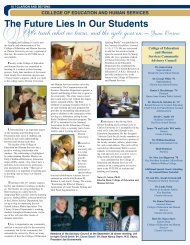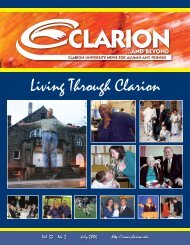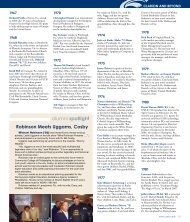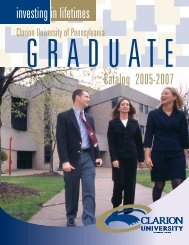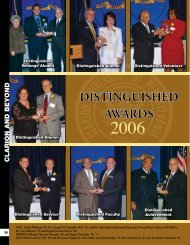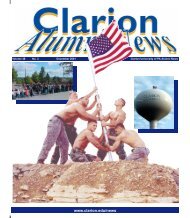Graduate - Clarion University
Graduate - Clarion University
Graduate - Clarion University
- No tags were found...
Create successful ePaper yourself
Turn your PDF publications into a flip-book with our unique Google optimized e-Paper software.
<strong>Clarion</strong> <strong>University</strong> of Pennsylvania 25BIOL 555: Endocrinology 3 s.h.A survey of the chemical and physiological principles of hormonal integrations in animals. Three lecture hours perweek.BIOL 556: Entomology 3 s.h.A general study of insects, including structure, physiology, classification, economic importance, and relationships. Twolecture and three laboratory or field work hours weekly. Fall, odd-numbered years.BIOL 559: Physiological Ecology 3 s.h.Nearly every habitat on earth, from thermal hot springs to polar ice caps, is home to some form of life. Physiologicalecology explores the biotic and abiotic challenges to organisms imposed by their environments and adaptations which allowthem to survive in various habitats, both in terms of how organisms physiologically adapt to short-term fluctuations in theirenvironment and how adaptations influence biogeographic distribution and evolutionary success of various species. Topicsinclude adaptations related to temperature, water and salt balance, and gas exchange. Adaptations of organisms to extreme orunusual environments may be considered. Prerequisite: BIOL 202, 203, 451, or permission. Spring, alternate years.BIOL 563: Behavioral Ecology 3 s.h.An examination of the behavior of animals in relation to their natural environment with emphasis on the functioning ofpatterns of behavior in nature, intraspecific communication and social organization, behavioral relationships between species,and the regulation of behavior by the environment. (Pymatuning)BIOL 571: Habitat Ecology–Aquatic 6 s.h.A detailed examination is made of the structure and functioning of selected aquatic ecosystems. Emphasis is placed onthe interrelationships of functioning systems. (3 credits at Pymatuning)BIOL 572: Terrestrial Community Ecology 6 s.h.A study of the composition, distribution, and dynamics of plants and animals in selected terrestrial communities. Majorbiomes to be included will be grassland, deciduous forest, coniferous forest, and tundra. Summers only: six weeks. (3 creditsat Pymatuning)BIOL 573: Freshwater Ecology 3 s.h.A field-oriented study of the physics, chemistry, and biology of standing and flowing inland waters.BIOL 574: Ecology of Aquatic Insects 3 s.h.Examination of the ecological adaptations of aquatic insects with special emphasis on morphology, habitat, and trophicrelationships. (Pymatuning)BIOL 575: Experimental Ecology 3 s.h.Study of designs suitable for investigation of natural populations and communities stressing statistical analysis, and thelogical control of experiments in natural situations. (Pymatuning)BIOL 576: Fungal Ecology 3 s.h.Emphasis will be on the role of fungi in the decomposition of organic materials in terrestrial and aquatic communities,and the recycling of mineral nutrients. (Pymatuning)BIOL 577: Forest Ecology 3 s.h.An in-depth approach to the structure, function, and dynamics of forest ecosystems at multiple scales. Lecture and discussionfocuses on current topics in forest ecology and management such as major forest types and climate, influence of physical factorslike soils and hydrology on forest ecosystem function, the importance of disturbance, herbivores, and pathogens in structuringforest ecosystems, and the concept and practice of sustainability in forest management. Laboratory emphasizes descriptiveand investigative studies of local forest ecosystems. Two lecture and three laboratory hours weekly. Fall, alternate years.BIOL 578: Biome Studies 3 s.h.A travel-study program which offers opportunities for study in the various biomes, e.g., grasslands, montane, seashore,etc. Summers only. Prerequisites: Environmental Biology or permission of instructor.BIOL 579: Alpine Ecology 3 s.h.Students travel to the Beartooth Mountains in northern Wyoming where they may undertake field studies of aquatic andterrestrial communities along an altitudinal transect. Permission to register granted on an individual basis. (Students will sharecost of travel and food. Tents and cooking facilities will be provided.) (Pymatuning)BIOL 581: Microbial Genetics 3 s.h.A study of bacterial and viral genetics with emphasis upon mutation, mutant selection, gene action, recombination geneticmapping, gene regulation, and recombinant DNA technology. Laboratory sessions are on an arranged basis. Prerequisite:permission of instructor. Two lecture and three lab hours per week.BIOL 583: Molecular Biology 4 s.h.The study of the structural and functional relationships of the major biological macro-molecules, with emphasis on nucleicacid biology. Current systems, methods, and applications of biotechnology, including recombinant DNA techniques, will beemphasized in the laboratory. Two lectures and three laboratory hours weekly. Spring, annually.BIOL 585: Biotechnology 4 s.h.Advanced topics in the current systems, methods, and applications of recombinant DNA and protein biotechnology. Threelecture/discussion and three lab hours each week. Prerequisite: BIOL 483/583 or consent of instructor. Spring, annually.BIOL 591: Biogeography 3 s.h.The subject matter covers aspects of the distribution of plants and animals. Main topics of concern include interpretiveapproaches to biogeography, paleobiogeographic evidence of past distributions, the centers of origin of various groups,mechanisms and routes of dispersal and colonization, and the dynamics of extinction. Prerequisites: BIOL 202 and 203.Biology



